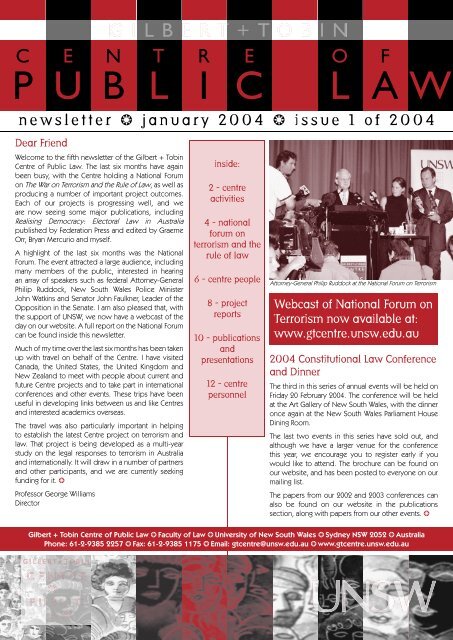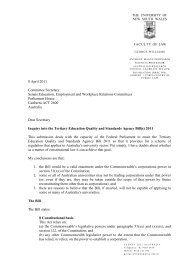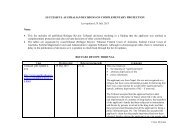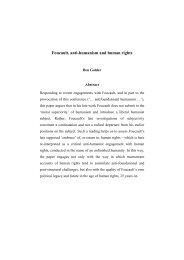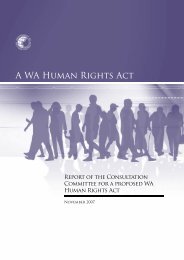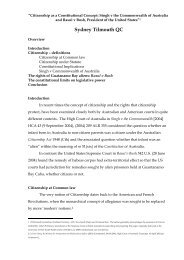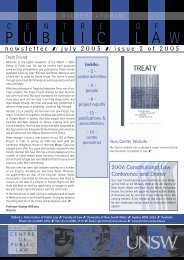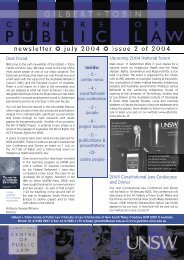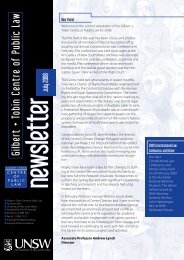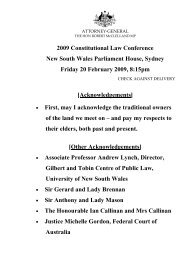January 2004 - Gilbert + Tobin Centre of Public Law
January 2004 - Gilbert + Tobin Centre of Public Law
January 2004 - Gilbert + Tobin Centre of Public Law
Create successful ePaper yourself
Turn your PDF publications into a flip-book with our unique Google optimized e-Paper software.
G I L B E R T + T O B I N<br />
C E N T R E O F<br />
P U B L I C L A W<br />
n e w s l e t t e r j a n u a r y 2 0 0 4 i s s u e 1 o f 2 0 0 4<br />
Dear Friend<br />
Welcome to the fi fth newsletter <strong>of</strong> the <strong>Gilbert</strong> + <strong>Tobin</strong><br />
<strong>Centre</strong> <strong>of</strong> <strong>Public</strong> <strong>Law</strong>. The last six months have again<br />
been busy, with the <strong>Centre</strong> holding a National Forum<br />
on The War on Terrorism and the Rule <strong>of</strong> <strong>Law</strong>, as well as<br />
producing a number <strong>of</strong> important project outcomes.<br />
Each <strong>of</strong> our projects is progressing well, and we<br />
are now seeing some major publications, including<br />
Realising Democracy: Electoral <strong>Law</strong> in Australia<br />
published by Federation Press and edited by Graeme<br />
Orr, Bryan Mercurio and myself.<br />
A highlight <strong>of</strong> the last six months was the National<br />
Forum. The event attracted a large audience, including<br />
many members <strong>of</strong> the public, interested in hearing<br />
an array <strong>of</strong> speakers such as federal Attorney-General<br />
Philip Ruddock, New South Wales Police Minister<br />
John Watkins and Senator John Faulkner, Leader <strong>of</strong> the<br />
Opposition in the Senate. I am also pleased that, with<br />
the support <strong>of</strong> UNSW, we now have a webcast <strong>of</strong> the<br />
day on our website. A full report on the National Forum<br />
can be found inside this newsletter.<br />
Much <strong>of</strong> my time over the last six months has been taken<br />
up with travel on behalf <strong>of</strong> the <strong>Centre</strong>. I have visited<br />
Canada, the United States, the United Kingdom and<br />
New Zealand to meet with people about current and<br />
future <strong>Centre</strong> projects and to take part in international<br />
conferences and other events. These trips have been<br />
useful in developing links between us and like <strong>Centre</strong>s<br />
and interested academics overseas.<br />
The travel was also particularly important in helping<br />
to establish the latest <strong>Centre</strong> project on terrorism and<br />
law. That project is being developed as a multi-year<br />
study on the legal responses to terrorism in Australia<br />
and internationally. It will draw in a number <strong>of</strong> partners<br />
and other participants, and we are currently seeking<br />
funding for it. <br />
Pr<strong>of</strong>essor George Williams<br />
Director<br />
inside:<br />
2 - centre<br />
activities<br />
4 - national<br />
forum on<br />
terrorism and the<br />
rule <strong>of</strong> law<br />
6 - centre people<br />
8 - project<br />
reports<br />
10 - publications<br />
and<br />
presentations<br />
12 - centre<br />
personnel<br />
Attorney-General Philip Ruddock at the National Forum on Terrorism<br />
Webcast <strong>of</strong> National Forum on<br />
Terrorism now available at:<br />
www.gtcentre.unsw.edu.au<br />
<strong>2004</strong> Constitutional <strong>Law</strong> Conference<br />
and Dinner<br />
The third in this series <strong>of</strong> annual events will be held on<br />
Friday 20 February <strong>2004</strong>. The conference will be held<br />
at the Art Gallery <strong>of</strong> New South Wales, with the dinner<br />
once again at the New South Wales Parliament House<br />
Dining Room.<br />
The last two events in this series have sold out, and<br />
although we have a larger venue for the conference<br />
this year, we encourage you to register early if you<br />
would like to attend. The brochure can be found on<br />
our website, and has been posted to everyone on our<br />
mailing list.<br />
The papers from our 2002 and 2003 conferences can<br />
also be found on our website in the publications<br />
section, along with papers from our other events. <br />
<strong>Gilbert</strong> + <strong>Tobin</strong> <strong>Centre</strong> <strong>of</strong> <strong>Public</strong> <strong>Law</strong> Faculty <strong>of</strong> <strong>Law</strong> University <strong>of</strong> New South Wales Sydney NSW 2052 Australia<br />
Phone: 61-2-9385 2257 Fax: 61-2-9385 1175 Email: gtcentre@unsw.edu.au www.gtcentre.unsw.edu.au<br />
G I L B E R T + T O B I N<br />
C E N T R E<br />
O F<br />
P U B L I C<br />
L A W
<strong>Centre</strong> Activities<br />
Stephen Lam<br />
Breakfast roundtable with Stephen<br />
Lam, Hong Kong’s Secretary for<br />
Constitutional Affairs<br />
On 28 September 2003, the <strong>Centre</strong>, in conjunction with<br />
the Asia-Australia Institute and the Hong Kong Economic<br />
and Trade Office, hosted a roundtable discussion with<br />
Stephen Lam, the Secretary for Constitutional Affairs in<br />
the Hong Kong Special Administrative Region (HKSAR).<br />
Participants included former Chief Justice <strong>of</strong> the High<br />
Court Sir Anthony Mason, Federal Court Judge Ronald<br />
Sackville and NSW Senator Marise Payne.<br />
Mr Lam’s position as Secretary for Constitutional<br />
Affairs places him at the heart <strong>of</strong> the constitutional<br />
controversies that Hong Kong currently faces. He has<br />
responsibility for overseeing the implementation <strong>of</strong><br />
Hong Kong’s Basic <strong>Law</strong> and Hong Kong’s policies on<br />
electoral affairs. In addition, he plays a pivotal role in<br />
maintaining Hong Kong’s external relationships and<br />
in developing a close relationship with the Chinese<br />
mainland.<br />
Discussion at the event mainly focussed on Hong<br />
Kong’s recent constitutional crises. The event included<br />
a challenging and stimulating discussion about the<br />
present and future state <strong>of</strong> political affairs in Hong<br />
Kong. <br />
Rights and recognition<br />
go hand in hand with<br />
economic and social<br />
development.<br />
Sean Brennan, ‘Practical Reconciliation:<br />
Only Half the Story’, Perspective, ABC<br />
Radio National, (20 November 2003).<br />
If the Australian people<br />
are asked to vote on<br />
reform <strong>of</strong> the Senate, any<br />
proposal must balance<br />
the Senate’s existing<br />
strengths against the need<br />
for stable and effective<br />
government. This cannot<br />
be achieved by piecemeal<br />
reform, particularly reform<br />
that will rightly be seen<br />
by the people as serving<br />
only the interests <strong>of</strong> the<br />
government <strong>of</strong> the day.<br />
George Williams, ‘Beware Senate<br />
Reform that Seeks to Only Block the<br />
Block’ Sydney Morning Herald (9<br />
October 2003).<br />
2<br />
Quentin Baxter lecture, Victoria<br />
University, Wellington<br />
<strong>Centre</strong> Director George Williams delivered ‘The Case<br />
that Stopped a Coup The Rule <strong>of</strong> <strong>Law</strong> in Fiji’ at the<br />
2003 Quentin-Baxter Memorial Trust Lecture. The<br />
lecture, held on 27 November 2003, was organised by<br />
the New Zealand <strong>Centre</strong> for <strong>Public</strong> <strong>Law</strong> at the Victoria<br />
University <strong>of</strong> Wellington, Wellington, New Zealand.<br />
George Williams<br />
<strong>Gilbert</strong> + <strong>Tobin</strong> <strong>Centre</strong> <strong>of</strong> <strong>Public</strong> <strong>Law</strong><br />
Newsletter
New books<br />
Federation Press has recently<br />
published Realising Democracy:<br />
Electoral <strong>Law</strong> in Australia. The<br />
volume draws together as<br />
contributors a range <strong>of</strong> insiders and<br />
other Australian and international<br />
commentators with long experience<br />
in electoral administration and<br />
electoral law. Authors include<br />
leading lawyers, political scientists, historians and<br />
electoral administrators.<br />
<strong>Centre</strong> Director George Williams is series editor <strong>of</strong> a<br />
new line <strong>of</strong> books, entitled <strong>Law</strong> at Large, from University<br />
<strong>of</strong> New South Wales Press. The books on legal topics <strong>of</strong><br />
broad contemporary significance are aimed at both a<br />
legal and non legal audience.<br />
The first book in the series, by<br />
Pr<strong>of</strong>essor Brian Horrigan <strong>of</strong> the<br />
University <strong>of</strong> Canberra, Adventures<br />
in <strong>Law</strong> and Justice: Exploring Big<br />
Legal Issues in Everyday Life, has just<br />
been published. It was launched in<br />
Sydney by James O’Loghlin, evening<br />
presenter on ABC Radio 702 in<br />
Sydney.<br />
The <strong>Law</strong> at Large series will include small to medium<br />
sized books, and a number <strong>of</strong> authors are now under<br />
contract. If you have any interest in contributing to the<br />
series, please contact the <strong>Centre</strong> Director.<br />
UNSW Press has also recently<br />
published Terror <strong>Law</strong>s: ASIO<br />
Counter-Terrorism and the Threat to<br />
Democracy by Associate Pr<strong>of</strong>essor<br />
Jenny Hocking <strong>of</strong> Monash University.<br />
The book, which contains a forward<br />
by the <strong>Centre</strong> Director, marks an<br />
important contribution to the<br />
ongoing debate over new security<br />
laws for Australia. <br />
If [unilateralism, pre-emption<br />
and humanitarian intervention]<br />
are recognised<br />
as part <strong>of</strong> the international<br />
legal order, will they become<br />
a destabilising force<br />
in the delicate ecosystem<br />
<strong>of</strong> the international community<br />
… Of course,<br />
it is always difficult to<br />
forecast the effect <strong>of</strong> a<br />
new legal order on future<br />
international stability. We<br />
might, however, question<br />
whether the Israeli experience<br />
provides a microcosmic<br />
example.<br />
Devika Hovell, Perspective, ABC Radio<br />
National (7 November 2003)<br />
3<br />
Australian Policy Online grant<br />
<strong>Centre</strong> Director George Williams was a partner with<br />
other academics in a grant application to upgrade the<br />
online social science research website Australian Policy<br />
Online (www.apo.org.au). Australian Policy Online<br />
provides access to research from nearly 100 member<br />
centres and institutes to create a national, searchable<br />
electronic gateway for academic researchers,<br />
librarians, public servants, journalists and students. The<br />
site is maintained by the Institute for Social Research at<br />
Swinburne University <strong>of</strong> Technology.<br />
The application was successful, with the Australian<br />
Research Council awarding the project $108,045.<br />
We are looking forward to working more closely<br />
with Australian Policy Online in the future and in<br />
continuing to develop innovative and accessible ways<br />
<strong>of</strong> communicating with a broad audience about our<br />
research and activities in the area <strong>of</strong> public law. <br />
<strong>January</strong> <strong>2004</strong><br />
www.gtcentre.unsw.edu.au
National Forum on Terrorism and the Rule <strong>of</strong> <strong>Law</strong><br />
The <strong>Centre</strong> held a successful National Forum on The<br />
War on Terrorism and the Rule <strong>of</strong> <strong>Law</strong> on Monday,<br />
10 November 2003 at New South Wales Parliament<br />
House. Over 125 attendees from a wide spectrum <strong>of</strong><br />
the community participated in this timely and topical<br />
event.<br />
Given the controversy regarding the passage <strong>of</strong> the<br />
ASIO Bill, the war on Iraq and continuing spectre <strong>of</strong><br />
terrorism in the Australian community since Bali, this<br />
conference allowed Federal and State politicians,<br />
experts in the legal and intelligence community and<br />
public commentators to discuss the balance between<br />
the need for increased security and Australia’s respect<br />
for the rule <strong>of</strong> law and human rights.<br />
A webcast <strong>of</strong> the event is available from the <strong>Centre</strong><br />
website. Papers from the conference are also available<br />
on the website.<br />
The Hon John Watkins MP, NSW Police Minister:<br />
‘It is appropriate that the topic that I was asked to<br />
address was the State response to September 11<br />
because if a terrorist event were to occur in NSW - it<br />
would overwhelmingly be dealt with as a State matter.’<br />
The Hon Philip Ruddock MP, Commonwealth<br />
Attorney-General:<br />
‘In terms <strong>of</strong> Australia’s legislative response to terrorism<br />
the very same principles <strong>of</strong> community acceptance,<br />
opinion and tolerance apply.’<br />
‘But I make no secret <strong>of</strong> the fact that I do not believe<br />
the legislation as it stands is quite right. As I said<br />
before, sometimes there are trade <strong>of</strong>fs. And we are in<br />
a position where we possibly have an outcome that is<br />
third or fourth best.’<br />
‘We have not - and we will not - shy away from our<br />
responsibility to give our intelligence agencies the<br />
powers they need to fi ght terrorism effectively. If this<br />
means putting new powers into place - so be it.’<br />
4<br />
The Hon Senator John Faulkner, Leader <strong>of</strong> the<br />
Opposition in the Senate (pictured speaking to<br />
Dr Helen Irving):<br />
‘It is somewhat ironic that Ministers and Government<br />
members speaking to the media after the Bill was<br />
passed focussed on the balanced nature <strong>of</strong> ASIO’s<br />
new powers. They hang their hats on the safeguards,<br />
reassuring everyone there are proper checks and<br />
balances…But those safeguards are all in there as a<br />
result <strong>of</strong> Labor insisting on them in negotiations with<br />
the Government and because <strong>of</strong> our amendments in<br />
the Senate.’<br />
Devika Hovell<br />
Devika Hovell, Director, International <strong>Law</strong><br />
Project, UNSW (right):<br />
‘The international response to the [Lockerbie disaster]<br />
took 15 years. It was slow and unwieldy, and people<br />
became very frustrated in the process. Nevertheless,<br />
the issue was resolved. And, notably, following the<br />
loss <strong>of</strong> 270 lives in the bombing itself, no further life<br />
was lost in the resolution <strong>of</strong> the issue.’<br />
<strong>Gilbert</strong> + <strong>Tobin</strong> <strong>Centre</strong> <strong>of</strong> <strong>Public</strong> <strong>Law</strong><br />
Newsletter
Paul Kelly, Editor-at-Large, The Australian:<br />
‘I identify fi ve defi ning strategic challenges for the<br />
international community and for Australia. The fi rst...is<br />
the crisis, or perhaps better described as the civil<br />
war within Islam...[Secondly,] simultaneous with their<br />
own civil war, the Islamic extremists are also waging<br />
a war against the west, against Christians and against<br />
Zionists... [Thirdly,] the new type <strong>of</strong> threat...this is an<br />
asymmetrical war...the enemy is not a nation state, but<br />
a privatised terror network... [Fourthly,] the rise <strong>of</strong> the<br />
rogue state... [Fifthly,] the new role <strong>of</strong> the United States<br />
in the world as a revolutionary power...[Bush] could<br />
have responded in terms <strong>of</strong> the tradition <strong>of</strong> American<br />
internationalism or he could have responded in terms<br />
<strong>of</strong> the tradition <strong>of</strong> American exceptionalism and he did<br />
the latter.’<br />
Dr Jenny Hocking, Director, National <strong>Centre</strong> for<br />
Australian Studies, Monash University:<br />
‘There is no doubt that these counter-terrorism<br />
measures represent the greatest contemporary<br />
challenge to relations between the arms <strong>of</strong> government<br />
(the judiciary, the parliament and the Executive) and<br />
to long established civil and political rights since the<br />
liberal Prime Minister Robert Menzies’ several failed<br />
attempts, through three spheres <strong>of</strong> governance, to pass<br />
the Communist Party Dissolution Bill.’<br />
Stephen Kenny, Camatta Lempens, <strong>Law</strong>yers<br />
for the Hicks Family (pictured left with Philip<br />
Ruddock):<br />
‘What exactly does the Australian Government say<br />
about this. Very little it would appear and certainly I<br />
have not seen or heard any criticism from the Australian<br />
Government about the procedures. Although they<br />
have sought a number <strong>of</strong> changes and guarantees such<br />
as that the death penalty shall not apply to David Hicks<br />
and Mamdouh Habib, they have as far as I am aware on<br />
no occasion sought to ensure that Australian citizens<br />
receive a standard <strong>of</strong> justice equal to that provided to<br />
Mr Walker Lind, an American citizen. It appears their<br />
position is that they are happy for an Australian citizen<br />
to receive a lesser standard <strong>of</strong> justice.’<br />
<strong>January</strong> <strong>2004</strong><br />
5<br />
Michael Gawenda, Editor-in-Chief, The Age<br />
(pictured left with Stephen Kenny and Megan<br />
Davis):<br />
‘People felt unsafe, threatened, at war even. And the<br />
Government made it impossible for us [the media] to<br />
make the asylum seekers human, to tell their stories, to<br />
show that they were individual human beings with the<br />
same hopes and dreams and aspirations as the rest <strong>of</strong><br />
us. We were not allowed into the detention centres,<br />
despite repeated requests. We were not allowed onto<br />
the Tampa. We were not allowed into the detention<br />
centres on Nauru and PNG. We could not get to the<br />
people who had been accused <strong>of</strong> being less than<br />
human for throwing their children into the ocean to<br />
see for ourselves whether they were human or not. We<br />
made endless requests and demands. We failed.’<br />
www.gtcentre.unsw.edu.au
<strong>Centre</strong> People<br />
Cassandra Goldie, Homelessness,<br />
Human Rights and the <strong>Law</strong><br />
Cassandra Goldie is Director <strong>of</strong> the <strong>Centre</strong>’s new<br />
Homelessness Legal Rights Project and is also<br />
undertaking related PhD research supervised by Garth<br />
Nettheim and George Williams.<br />
Homelessness is a major human rights issue for Australia.<br />
Based on the most recent 2001 Census analysis, it<br />
is estimated that about 100,000 people experience<br />
some level <strong>of</strong> homelessness at any given time.<br />
However, whilst a significant body <strong>of</strong> Australian public<br />
policy knowledge and research has been generated<br />
about the economic, social and cultural aspects <strong>of</strong><br />
homelessness, there has historically been relatively<br />
limited scholarship about the legal and human rights<br />
<strong>of</strong> people facing homelessness. The Homelessness<br />
Legal Rights Project and the PhD research aim to make a<br />
contribution to that end.<br />
Cassandra commenced her PhD in 2002 whilst still<br />
Coordinator and Principal Solicitor <strong>of</strong> the Darwin<br />
Community Legal Service. She holds a Masters <strong>of</strong> <strong>Law</strong>s<br />
from University College London specialising in <strong>Public</strong><br />
International <strong>Law</strong> and was awarded an Australian Post<br />
Graduate Scholarship to undertake her PhD studies.<br />
Using the case study <strong>of</strong> Darwin, the PhD examines<br />
the extent to which domestic and international legal<br />
resources may be available to homeless people to<br />
assert greater legitimacy and control over their use <strong>of</strong><br />
this space. The thesis considers the Australian criminal<br />
law, administrative and anti-discrimination law and<br />
the common law regarding the extent to which there<br />
are currently limits to the permissible regulation <strong>of</strong><br />
this space. The research also examines international<br />
and comparative human rights law and discourse<br />
to establish to what extent alternative jurisdictions<br />
recognise ‘rights’ in relation to homeless people’s<br />
use <strong>of</strong> public space. The thesis seeks to contribute<br />
the development <strong>of</strong> alternative legal and institutional<br />
arrangements for the regulation <strong>of</strong> public space that<br />
might better respect the human rights <strong>of</strong> homeless<br />
people without unduly infringing upon the legitimate<br />
interests <strong>of</strong> third parties.<br />
<strong>Gilbert</strong> + <strong>Tobin</strong> <strong>Centre</strong> <strong>of</strong> <strong>Public</strong> <strong>Law</strong><br />
6<br />
Cassandra Goldie<br />
In conjunction with the PhD research, Cassandra is<br />
Director <strong>of</strong> the Homelessness Legal Rights Project.<br />
Funded in part by the <strong>Law</strong> and Justice Foundation <strong>of</strong><br />
New South Wales, and the <strong>Centre</strong>, the Project is in<br />
partnership with the <strong>Public</strong> Interest <strong>Law</strong> Clearing House<br />
Homeless Persons’ Legal Clinic in Melbourne.<br />
The Project administers a national email list on<br />
Homelessness, Human Rights and the <strong>Law</strong> and<br />
publishes a regulate Resource Bulletin. There are<br />
over 250 subscribers to the national list, consisting <strong>of</strong><br />
tenancy and housing workers, crisis accommodation<br />
services, lawyers and academics, people who have<br />
experienced homelessness, journalists and public<br />
policy makers.<br />
The Project maintains the Homelessness, Human<br />
Rights and the <strong>Law</strong> Resource Web Page and, subject<br />
to available resources, also provides support to<br />
research and advocacy initiatives that seek to promote<br />
the human rights <strong>of</strong> people facing homelessness. To<br />
date, the Project has contributed to or supported<br />
a range <strong>of</strong> initiatives, including the Legal Needs <strong>of</strong><br />
Homeless People Research Project <strong>of</strong> the <strong>Law</strong> and<br />
Justice Foundation <strong>of</strong> New South Wales, the New<br />
South Wales Boarders and Lodgers Campaign, the<br />
Longgrass Association Freedom to Sleep Protest, the<br />
Homeless People’s Association in Melbourne, and the<br />
Disability Discrimination Act 1992 (Cth) and Drug Use<br />
Campaign.<br />
Since commencing her PhD and the Homelessness<br />
Legal Rights Project, Cassandra has published several<br />
papers and presented in a range <strong>of</strong> forums, including<br />
the ACOSS 2002 Congress in Hobart, the 2003 National<br />
Homelessness Conference in Brisbane, the Housing and<br />
Homelessness Action Planning Day in Melbourne, and<br />
the Northern Territory Social Policy Forum in Darwin.<br />
She has also been a Visiting Lecturer in International <strong>Law</strong><br />
at the Charles Darwin University in Darwin and a Guest<br />
Speaker on <strong>Public</strong> Interest <strong>Law</strong> for the UNSW Kingsford<br />
Legal <strong>Centre</strong> Clinical Legal Education Program. <br />
Newsletter
Thomas Poole, Andrew Lynch and Sean Brennan<br />
New Visiting Pr<strong>of</strong>essor and <strong>Centre</strong><br />
Associate<br />
Pr<strong>of</strong>essor Jeremy Webber has joined the Faculty <strong>of</strong> <strong>Law</strong><br />
at UNSW as a Visiting Pr<strong>of</strong>essor and the <strong>Centre</strong> as an<br />
Associate. Jeremy holds the Canadian Research Chair in<br />
<strong>Law</strong> and Society in the Faculty <strong>of</strong> <strong>Law</strong> at the University<br />
<strong>of</strong> Victoria in Canada. He was previously Dean <strong>of</strong> <strong>Law</strong> at<br />
the University <strong>of</strong> Sydney and is internationally known as<br />
a law and society scholar working in the fields <strong>of</strong> cultural<br />
diversity, constitutional theory and Indigenous rights.<br />
He is the author <strong>of</strong> Reimagining Canada: Language,<br />
Culture, Community and the Canadian Constitution<br />
(1994). Jeremy will be teaching a subject in March<br />
<strong>2004</strong> in the <strong>Law</strong> Faculty’s postgraduate program called<br />
‘<strong>Law</strong>, Constitutionalism and Culture’.<br />
<strong>Centre</strong> Visitors<br />
We will have a number <strong>of</strong> visitors over <strong>2004</strong>.<br />
Dan Meagher<br />
Dan will be a visiting scholar at the <strong>Centre</strong> for two<br />
months beginning in early <strong>January</strong>. He is currently a<br />
lecturer in constitutional law and criminal procedure at<br />
Deakin University in Geelong. Dan is presently enrolled<br />
as a PhD student at UNSW with George Williams as<br />
supervisor, the topic <strong>of</strong> his thesis being ‘Rethinking the<br />
regulation <strong>of</strong> race hate in Australia’. His time at UNSW<br />
will be devoted to progressing his thesis.<br />
Andrew Lynch<br />
Andrew will be visiting from December 2003 until June<br />
<strong>2004</strong>. He is a Senior Lecturer at the Faculty <strong>of</strong> <strong>Law</strong>, UTS<br />
and has been a postgraduate student <strong>of</strong> the School <strong>of</strong><br />
<strong>Law</strong>, UNSW since 2001. He is working on a thesis under<br />
the supervision <strong>of</strong> Pr<strong>of</strong>essor George Williams. His<br />
thesis topic is concerned with the impact <strong>of</strong> judicial<br />
disagreement, especially dissenting judgments, upon<br />
the development <strong>of</strong> Australian constitutional law.<br />
During his visit he will be continuing work on his<br />
doctorate.<br />
The use <strong>of</strong> force by<br />
Australia can raise<br />
different issues than<br />
were imagined at the<br />
time our Constitution was<br />
drafted. A key question<br />
in 2003 has been whether<br />
Australia should breach its<br />
international obligations,<br />
as I believe it did, in using<br />
force in Iraq. This can<br />
have ramifications for the<br />
nation and its long term<br />
security and economic<br />
prosperity beyond the<br />
decision to use force in<br />
a particular case. This is<br />
one, legal reason why it is<br />
no longer appropriate for<br />
the decision to use force<br />
to be left solely in the<br />
hands <strong>of</strong> the government<br />
<strong>of</strong> the day.<br />
George Williams, ‘Changing the Way<br />
we go to War’ Australian Financial<br />
Review (21 November 2003).<br />
7<br />
Thomas Poole<br />
Thomas has been a lecturer at the University <strong>of</strong><br />
Nottingham for over three years with particular<br />
interest in public law subjects, including judicial<br />
review and constitutional theory. He will visit UNSW<br />
from December 2003 until August/September <strong>2004</strong>.<br />
Thomas will continue work on the idea <strong>of</strong> common<br />
law constitutionalism that is influential amongst some<br />
UK public lawyers at the moment. Furthermore, he<br />
plans to take an active part in some <strong>of</strong> the project-work<br />
<strong>of</strong> the <strong>Centre</strong> and, in so doing, hopes to learn a little<br />
about Australian constitutional and administrative law.<br />
He also promised not to talk too much about the rugby<br />
(in any case, he supported Wales).<br />
Launch <strong>of</strong> website:<br />
International <strong>Law</strong> and the Australian<br />
Legal System<br />
www.ilals.unsw.edu.au<br />
<strong>January</strong> <strong>2004</strong><br />
www.gtcentre.unsw.edu.au
Project Reports<br />
ELECTORAL LAW PROJECT<br />
Project Director: Bryan Mercurio<br />
The Electoral <strong>Law</strong> Project is proud to announce the<br />
publication <strong>of</strong> Realising Democracy: Electoral <strong>Law</strong><br />
in Australia, the fi rst book written on the subject <strong>of</strong><br />
electoral law in Australia. The book, co-edited by<br />
Graeme Orr, Bryan Mercurio and George Williams, is<br />
published by Federation Press and can be purchased<br />
directly by contacting Federation Press on (02) 9552<br />
2200 or online at www.federationpress.com.au.<br />
The Project is now focusing its attention on two<br />
upcoming events. The fi rst is a workshop on ‘Political<br />
Finance <strong>Law</strong>’, to be held at Griffi th University in <strong>January</strong><br />
<strong>2004</strong>. The workshop will bring academics, electoral<br />
<strong>of</strong>fi cials and party representatives together to discuss<br />
this highly relevant and hotly debated issue. The other<br />
event is a ‘virtual’ Electoral <strong>Law</strong> Symposium to be<br />
featured in a special themed edition <strong>of</strong> the Federal <strong>Law</strong><br />
Review. The symposium will feature leading electoral<br />
scholars refl ecting on the shape and development<br />
<strong>of</strong> electoral law and its fi t with other areas <strong>of</strong> law.<br />
These two events are further evidence <strong>of</strong> the Project’s<br />
commitment to foster sustained research in this<br />
important fi eld by bringing electoral administrators,<br />
academics, and practitioners together both physically<br />
and intellectually.<br />
The Project also completed several research tasks since<br />
the last newsletter, including a joint piece written by<br />
Graeme Orr, Bryan Mercurio and George Williams for the<br />
Election <strong>Law</strong> Journal. Project Director Bryan Mercurio<br />
continued his work on electronic voting, writing a<br />
piece entitled ‘Discrimination in Electoral <strong>Law</strong>: Using<br />
Technology to Extend the Secret Ballot to Disabled<br />
and Illiterate Voters’ published in the Alternative <strong>Law</strong><br />
Journal and another entitled ‘Democracy in Decline:<br />
Can Online Voting Save the American Electoral System’<br />
to be published in the United States by the John<br />
<strong>Gilbert</strong> + <strong>Tobin</strong> <strong>Centre</strong> <strong>of</strong> <strong>Public</strong> <strong>Law</strong><br />
Bryan Mercurio<br />
Without intense lobbying<br />
by concerned citizens and<br />
advocates, the issue [<strong>of</strong><br />
ballot access for disabled<br />
voters] will continue to<br />
be misunderstood and<br />
not be included on the<br />
political agenda. However,<br />
as demonstrated in the<br />
US, effective lobbying<br />
and pressure can force<br />
politicians to face the issue<br />
and enact legislation to<br />
reasonably accommodate<br />
disabled voters.<br />
Bryan Mercurio, “Discrimination in<br />
electoral law: using technology to extend<br />
the secret ballot to disabled and<br />
illiterate voters”, (2003) 28 Alternative<br />
<strong>Law</strong> Journal 273.<br />
8<br />
Marshall Journal <strong>of</strong> Computer and Information <strong>Law</strong>.<br />
Our Project partner, Graeme Orr <strong>of</strong> Griffi th University,<br />
has also recently written several articles, including a<br />
piece entitled ‘Australian Electoral Systems - How<br />
Well do they Serve Political Equality’ for the Electoral<br />
Governance Workshop, Democratic Audit <strong>of</strong> Australia,<br />
Research School <strong>of</strong> Social Sciences, at the Australian<br />
National University.<br />
Both Bryan Mercurio and Graeme Orr also presented<br />
papers at the HS Chapman Society, Forum 24 on<br />
Electoral Governance, held on the campus <strong>of</strong> UNSW<br />
in October. Bryan presented a paper entitled ‘Some<br />
Problems with Computerised Voting’ and Graeme’s<br />
paper was entitled ‘Majors vs Minors: Ironies and<br />
Inequalities in Electoral <strong>Law</strong> as Evidenced in the<br />
Hanson Case and Others’. Graeme also recently<br />
presented a paper on campaign fi nance reform to an<br />
international workshop held in France. <br />
BILL OF RIGHTS PROJECT<br />
Project Director: Megan Davis<br />
Australia appears likely to have its fi rst Bill <strong>of</strong> Rights with<br />
the ACT Human Rights Bill 2003 being introduced into<br />
the ACT Legislative Assembly on 18 November 2003.<br />
The project has been busy revamping its popular Bill <strong>of</strong><br />
Rights resource webpage. The updated page includes<br />
information about the ACT Human Rights Bill 2003 as<br />
well as a survey <strong>of</strong> the history <strong>of</strong> Bill <strong>of</strong> Rights debates<br />
in Australia, a new section on the Bill <strong>of</strong> Rights policies<br />
for Australian political parties and an updated section<br />
devoted to web writings on a Bill <strong>of</strong> Rights in Australia,<br />
including law journal articles and newspaper pieces.<br />
The resource page can be found on our website.<br />
Megan also continues to conduct a research project<br />
with the Jumbunna Indigenous House <strong>of</strong> Learning at<br />
the UTS Faculty <strong>of</strong> <strong>Law</strong>, investigating the impact <strong>of</strong><br />
international trade law upon indigenous peoples’<br />
rights and international human rights law in general. The<br />
project is currently examining the potential benefi ts <strong>of</strong><br />
trade liberalisation for Indigenous Australia. <br />
Megan Davis<br />
Newsletter
INTERNATIONAL LAW PROJECT<br />
Project Director: Devika Hovell<br />
December marks the end <strong>of</strong> the first year <strong>of</strong> our threeyear<br />
project on ‘International <strong>Law</strong> and the Australian<br />
Legal System’. The Project aims to assess the interaction<br />
between international law and the Australian legal<br />
system in a systematic manner, and examine the need<br />
for reform. In its first year, the Project partners (the <strong>Centre</strong><br />
together with the <strong>Centre</strong> for <strong>Public</strong> and International<br />
<strong>Law</strong> at the ANU) have achieved the following:<br />
• <strong>Public</strong>ation <strong>of</strong> survey article in Sydney <strong>Law</strong><br />
Review<br />
The Project partners have an article in the December<br />
volume <strong>of</strong> the Sydney <strong>Law</strong> Review entitled ‘Deep<br />
Anxieties: Australia and the International Legal Order’.<br />
The Australian Constitution says little about the nature<br />
<strong>of</strong> the relationship between international law and<br />
the Australian legal framework. Accordingly, it has<br />
been left to the executive, legislature and judiciary to<br />
develop mechanisms to respond to international law.<br />
Not unsurprisingly, this ad hoc approach has led to<br />
incoherencies in Australia’s response to international<br />
law. The Project’s role is now to determine whether<br />
these incoherencies are unavoidable in Australia’s<br />
approach to this inherently political body <strong>of</strong> law, or<br />
whether the system should be streamlined to dispel<br />
these incoherencies.<br />
• Launch <strong>of</strong> website<br />
Detailed information relating to ‘International <strong>Law</strong><br />
and the Australian Legal System’ can now be found<br />
on the project website at www.ilals.unsw.edu.au.<br />
The website contains information about the project<br />
personnel, publications, conferences and events.<br />
Most importantly, the website includes a Resources<br />
page, which acts as a database <strong>of</strong> resources on the<br />
relationship between international law and Australian<br />
law, including Australian judicial decisions, executive<br />
and legislative reports, and secondary materials. The<br />
website also includes ‘Diary Extracts’ from Australia’s<br />
relationship with international law, providing links to<br />
newspaper articles, reports and government releases<br />
depicting in a more tangible fashion Australia’s dayto-day<br />
interaction with international law. Suggested<br />
updates to the website can be emailed to Devika<br />
Hovell at d.hovell@unsw.edu.au.<br />
• Case studies<br />
The Project partners are presently engaged in two<br />
pilot case studies in order to examine in further detail<br />
Australia’s approach to treaty negotiation, signature<br />
and ratification. The case studies are focussing on<br />
two treaties: the Optional Protocol to the International<br />
Covenant on Civil and Political Rights (opened for<br />
signature in December 1966 and acceded to by<br />
Australia on 25 September 1991) and the Framework<br />
Convention on Tobacco Control (opened for signature<br />
in June 2003 and signed by Australia in December<br />
2003). The Project partners are interviewing a range<br />
<strong>January</strong> <strong>2004</strong><br />
Given that race has been<br />
the defining feature in<br />
the relationship between<br />
the state and Indigenous<br />
peoples, who did not play<br />
a role in state-building,<br />
institutional symbolism<br />
such as an apology would<br />
go further to the creation<br />
<strong>of</strong> a sense <strong>of</strong> belonging<br />
than the maintenance <strong>of</strong><br />
the fiction that parliament<br />
can be trusted to protect<br />
the rights <strong>of</strong> Aboriginal<br />
and Torres Strait Islander<br />
people.<br />
Megan Davis, “Indigenous Peoples and<br />
Australian human rights tradition: the<br />
perennial footnote”, paper delivered<br />
at workshop ‘Protecting Human Rights<br />
in Australia: Past, Present and Future’,<br />
Melbourne, 10-12 December 2003.<br />
9<br />
<strong>of</strong> individuals involved in the ratification process <strong>of</strong><br />
both treaties. In doing so, we are attempting to piece<br />
together the story surrounding Australia’s entry into these<br />
treaties, to assess the issues impacting upon Australia’s<br />
decision to enter into treaties and to determine the<br />
nature <strong>of</strong> the decision-making process.<br />
Diary extracts: Australia’s relationship with<br />
international law<br />
11 December 2003 - Australia commits $800 million to<br />
restore order in PNG<br />
10 December 2003 - Australia opposes successful General<br />
Assembly resolution seeking International Court <strong>of</strong> Justice<br />
decision in Israel barrier<br />
9 December 2003 - High Court upholds gay refugee claim<br />
1 December 2003 - PM concerned injecting rooms breach<br />
international treaty obligations<br />
18 November 2003 - ACT introduces Australia’s first Bill <strong>of</strong><br />
Rights<br />
25 November 2003 - Government accepts Military<br />
Commissions for Guantanamo Bay detainees<br />
12 November 2003 - Australia’s boat people rejection<br />
violates Refugee Convention, says UN<br />
28 October 2003 - Australia to reduce military component<br />
in Solomon Islands<br />
3 October 2003 - WTO establishes dispute panel to hear<br />
Australia’s challenge to EU geographical indications<br />
6 August 2003 - UN Human Rights Committee finds Australia<br />
violated human rights in Young (veterans’ pension for samesex<br />
couples), Cabal (prisoners’ rights) and Baban (mandatory<br />
detention <strong>of</strong> asylum seekers)<br />
TREATY PROJECT<br />
Project Director: Sean Brennan<br />
The <strong>Centre</strong>’s Treaty Project has passed the halfway<br />
point. Research in the past six months has focused on<br />
Indigenous and non-Indigenous notions <strong>of</strong> sovereignty.<br />
This month we publish the second <strong>of</strong> our issues<br />
papers, which looks at that topic. Drawing on our June<br />
workshop on sovereignty and the excellent work done<br />
by our overseas intern from the University <strong>of</strong> Toronto,<br />
Brenda Gunn, the paper wrestles with the differing<br />
interpretations <strong>of</strong> the term, as part <strong>of</strong> a wider public<br />
law question <strong>of</strong> who has the power and authority to<br />
conclude treaties in Australia.<br />
Sean Brennan, the Director <strong>of</strong> the <strong>Centre</strong>’s Treaty Project,<br />
has also given a number <strong>of</strong> presentations, as part <strong>of</strong> the<br />
<strong>Centre</strong>’s attempt to engage with different communities<br />
while academic research and writing continues. Sean<br />
has presented locally, interstate and overseas as well as<br />
on ABC Radio National’s Perspective program.<br />
The <strong>Centre</strong>’s submission and evidence to the Senate<br />
Legal and Constitutional Committee’s inquiry into<br />
progress on national reconciliation was quoted<br />
a number <strong>of</strong> times in the Committee’s report<br />
Reconciliation: Off Track released in October 2003.<br />
In the coming six months, our attention will turn to the<br />
relationship between native title and the treaty debate,<br />
and to upgrading the project’s website and resources<br />
page. <br />
www.gtcentre.unsw.edu.au
<strong>Public</strong>ations and Presentations<br />
<strong>Public</strong>ations<br />
Joint <strong>Public</strong>ations<br />
Hilary Charlesworth, Madelaine Chiam, Devika Hovell<br />
and George Williams, ‘Deep Anxieties: Australia and the<br />
International Legal Order’ (2003) 25 Sydney <strong>Law</strong> Review<br />
423.<br />
Rachel Davis and George Williams, ‘Reform <strong>of</strong> the<br />
Judicial Appointments Process: Gender and the Bench<br />
<strong>of</strong> the High Court <strong>of</strong> Australia’ (2003) 27 Melbourne<br />
University <strong>Law</strong> Review 819.<br />
Devika Hovell and George Williams, ‘Advice to Hon<br />
Simon Crean MP on the Use <strong>of</strong> Force Against Iraq’ (2003)<br />
4(1) Melbourne Journal <strong>of</strong> International <strong>Law</strong> 183.<br />
Graeme Orr, Bryan Mercurio, and George Williams<br />
(eds), Realising Democracy: Electoral <strong>Law</strong> in Australia<br />
(Federation Press, 2003).<br />
Graeme Orr, Bryan Mercurio, and George Williams,<br />
‘The Australian Electoral Tradition’ in Graeme Orr,<br />
Bryan Mercurio, and George Williams (eds) Realising<br />
Democracy: Election <strong>Law</strong> in Australia (Federation Press,<br />
2003), 1.<br />
Graeme Orr, Bryan Mercurio, and George Williams,<br />
‘Australian Electoral <strong>Law</strong>: A Stock-take’ (2003) 2 Election<br />
<strong>Law</strong> Journal 383.<br />
John Pace and George Williams (eds), ‘Special Edition:<br />
A Bill <strong>of</strong> Rights for Australia’ (2003) 9(1) Australian<br />
Journal <strong>of</strong> Human Rights.<br />
George Williams<br />
‘Foreword’ to J Hocking, Terror <strong>Law</strong>s: ASIO, Counter-<br />
Terrorism and the Threat to democracy (UNSW Press,<br />
2003), vii-viii.<br />
‘The Whitlam Government and Constitutional Reform’ in<br />
Hocking, J and Lewis, C (eds), It’s Time Again: Whitlam<br />
and Modern Labor (Cica, 2003), 195.<br />
‘Constructing a Community-Based Bill <strong>of</strong> Rights’ in<br />
Campbell, T, Goldsworthy, J, and Stone, A (eds),<br />
Protecting Human Rights: Instruments and Institutions<br />
(Oxford University Press, 2003), 247.<br />
‘Review <strong>of</strong> Executive Action and the Rule <strong>of</strong> <strong>Law</strong> under<br />
the Australian Constitution’ (2003) 14 <strong>Public</strong> <strong>Law</strong> Review<br />
219 (with Duncan Kerr).<br />
‘Australian Values and the War Against Terrorism’ (2003)<br />
26 University <strong>of</strong> New South Wales <strong>Law</strong> Journal 191.<br />
‘National Security, Terrorism and Bills <strong>of</strong> Rights’ (2003) 9<br />
Australian Journal <strong>of</strong> Human Rights 263.<br />
Sean Brennan<br />
‘Native Title in the High Court <strong>of</strong> Australia a Decade after<br />
Mabo’ (2003) 14 <strong>Public</strong> <strong>Law</strong> Review 209.<br />
‘Whitlam and the Value <strong>of</strong> <strong>Law</strong> in Indigenous Affairs:<br />
Lessons for the Contemporary Debate on Reconciliation<br />
and a Treaty’ in Jenny Hocking and Colleen Lewis<br />
(eds), It’s Time Again. Whitlam and Modern Labor (Circa,<br />
2003), 138.<br />
‘Book Review: A New Constitution for Australia’ by Bede<br />
Harris [2003] <strong>Public</strong> <strong>Law</strong> 831.<br />
<strong>Gilbert</strong> + <strong>Tobin</strong> <strong>Centre</strong> <strong>of</strong> <strong>Public</strong> <strong>Law</strong><br />
10<br />
Megan Davis<br />
‘Globalising Human Rights: Aboriginal Women, customary<br />
Aboriginal law and the Australian common law’ based<br />
on workshop ‘Women, Crime and Globalisation: Feminist<br />
Perspectives for the New Millennium’ at the International<br />
Institute for the Sociology <strong>of</strong> <strong>Law</strong> (IISL),Onati, Spain, 23-26<br />
September 2003 (forthcoming Jan/Feb Hart Publishing).<br />
‘Civics Education and Human Rights’ (2003) 9(1)<br />
Australian Journal <strong>of</strong> Human Rights 235.<br />
‘International Human Rights <strong>Law</strong> and the Domestic Treaty<br />
process’ in ‘Treaty - Lets Get it Right!’ (ed) Aboriginal<br />
Studies Press (2003).<br />
Terrorism (Hot Topics No 42 Legal Information Access<br />
<strong>Centre</strong>, State Library <strong>of</strong> New South Wales).<br />
Devika Hovell<br />
‘The Sovereignty Stratagem: Australia’s Response to UN<br />
Human Rights Treaty Bodies’ (2003) 28 Alternative <strong>Law</strong><br />
Journal 297.<br />
Bryan Mercurio<br />
‘The Future <strong>of</strong> Dispute Settlement in the WTO: The<br />
Implementation Phase Under Scrutiny’ in Ross Buckley<br />
(ed), The WTO and the Doha Round: The Changing Face<br />
<strong>of</strong> World Trade (Kluwer <strong>Law</strong> International, 2003) 115.<br />
‘Discrimination at the Ballot Box: The Secret Ballot and<br />
Blind Voters’ (October 2003) 12(2) Human Rights<br />
Defender 2.<br />
‘Beyond the Paper Ballot: Discovering Computerised<br />
Voting’ in Graeme Orr, Bryan Mercurio, & George<br />
Williams (eds) Realising Democracy: Election <strong>Law</strong> in<br />
Australia, 230 (Federation Press, 2003).<br />
‘Discrimination in Electoral <strong>Law</strong>: Using Technology to<br />
Extend the Secret Ballot to Disabled and Illiterate Voters’<br />
(2003) 28 Alternative <strong>Law</strong> Journal 273.<br />
Presentations<br />
George Williams<br />
‘The Constitutional Role <strong>of</strong> Courts: Lessons from<br />
Australia’ delivered at Courts, First Annual Conference<br />
on the Primary Functions <strong>of</strong> Government, New Zealand<br />
<strong>Centre</strong> for <strong>Public</strong> <strong>Law</strong>, Victoria University <strong>of</strong> Wellington,<br />
Wellington, New Zealand, 28 November 2003.<br />
‘The Case that Stopped a Coup The Rule <strong>of</strong> <strong>Law</strong> in<br />
Fiji’ delivered at 2003 Quentin-Baxter Memorial Trust<br />
Lecture, New Zealand <strong>Centre</strong> for <strong>Public</strong> <strong>Law</strong>, Victoria<br />
University <strong>of</strong> Wellington, Wellington, New Zealand, 27<br />
November 2003.<br />
‘Aboriginal Peoples and the Australian Constitution:<br />
Issues <strong>of</strong> Race and Reconciliation’ delivered at Faculty<br />
Seminar, University <strong>of</strong> Auckland <strong>Law</strong> School, New<br />
Zealand (with Sean Brennan), 25 November 2003.<br />
‘The Executive and the Military: Commentary’ delivered<br />
at 2003 <strong>Public</strong> <strong>Law</strong> Weekend, ANU, Canberra, 8<br />
November 2003.<br />
‘Aboriginal Peoples and the Australian Constitution’<br />
delivered at School <strong>of</strong> <strong>Law</strong>, University <strong>of</strong> Glasgow,<br />
United Kingdom, 25 September 2003.<br />
Newsletter
‘Aboriginal Peoples and the Australian Constitution’<br />
delivered at University College London, United<br />
Kingdom, 23 September 2003.<br />
‘Terrorism: The View from Down Under’ delivered at <strong>Public</strong><br />
International <strong>Law</strong> Speaker Series, Columbia University <strong>Law</strong><br />
School, United States, 17 September 2003.<br />
‘Human Rights and Judicial Review in Australia’ delivered<br />
at Constitutionalism in the Charter Era, University <strong>of</strong><br />
Western Ontario, Canada, 12 September 2003.<br />
‘Terrorism and the <strong>Law</strong> in Australia after September 11<br />
and the Bali Attack’ delivered at Osgoode Hall <strong>Law</strong><br />
School, York University, Canada, 10 September 2003.<br />
‘Aboriginal Peoples and the Australian Constitution’<br />
delivered at Constitutional Roundtable, University <strong>of</strong><br />
Toronto <strong>Law</strong> Faculty, Canada, 8 September 2003.<br />
‘The Case that Stopped a Coup The Rule <strong>of</strong> <strong>Law</strong> and<br />
Constitutionalism in Fiji’ delivered at Comparative<br />
Constitutionalism Course, University <strong>of</strong> Sydney <strong>Law</strong><br />
School, 20 August 2003.<br />
Sean Brennan<br />
‘A Treaty Project’, delivered at National Community Legal<br />
<strong>Centre</strong>s Conference, Hobart, 2 September 2003.<br />
‘Treaty Issues in Australia’, delivered at ANTaR WA forum<br />
on Sovereignty, Identity and Justice – Recognising<br />
Aboriginal Nations, Perth, 26 August 2003.<br />
‘A Treaty or Treaties with Indigenous Peoples in<br />
Australia’, delivered at NSW <strong>Law</strong> Society Human Rights<br />
Committee, Sydney, 19 August 2003.<br />
Megan Davis<br />
‘Indigenous Peoples and Australian human rights<br />
tradition: the perennial footnote’ delivered at workshop<br />
‘Protecting Human Rights in Australia: Past, Present and<br />
Future’ The Novotel Hotel, St Kilda, December 10-12,<br />
2003.<br />
‘International Human Rights <strong>Law</strong> and Aboriginal<br />
Customary <strong>Law</strong>’ International <strong>Law</strong> Association/HREOC<br />
Seminar, 20 November 2003.<br />
‘Globalising Human Rights: Aboriginal Women,<br />
customary Aboriginal law and the Australian common<br />
law’ at ‘Women, Crime and Globalisation: Feminist<br />
Perspectives for the New Millennium’ at the International<br />
Institute for the Sociology <strong>of</strong> <strong>Law</strong> (IISL),Onati, Spain, 23-<br />
26 September 2003.<br />
‘Case Studies and Current Research regarding Customary<br />
Protocols and Intellectual Property from Aboriginal<br />
Australia’ WIPO North American Workshop on Intellectual<br />
property and Traditional Knowledge, Ottawa, Canada,<br />
7-9 September 2003.<br />
‘International Trade <strong>Law</strong> and Indigenous Australia’, UTS<br />
Jumbunna Indigenous House <strong>of</strong> Learning, Seminar Series.<br />
Devika Hovell<br />
‘A New Order <strong>of</strong> Things Terrorism and International<br />
<strong>Law</strong>’, National Forum on The War On Terrorism and<br />
the Rule <strong>of</strong> <strong>Law</strong>, NSW Parliament House, Sydney, 10<br />
November 2003.<br />
<strong>January</strong> <strong>2004</strong><br />
11<br />
‘International <strong>Law</strong> and Post-War Iraq’, University <strong>of</strong> New<br />
South Wales Expo, 6 September 2003.<br />
‘Anachronism or Answer: Australian Sovereignty and the<br />
Human Rights Committee’, 11th Annual Australia and<br />
New Zealand Society <strong>of</strong> International <strong>Law</strong> Conference,<br />
Wellington, 5 July 2003.<br />
Media<br />
George Williams<br />
‘Changing the Way we go to War’ Australian Financial<br />
Review (21 November 2003).<br />
‘Terrorist <strong>Law</strong>s Tough Enough, if Used’ Sydney Morning<br />
Herald (4 November 2003).<br />
‘Why ASIO Should Not be Given More Power’ The Age<br />
(4 November 2003).<br />
‘Anti-Terrorism <strong>Law</strong>s Threaten Freedoms’ Courier Mail (4<br />
November 2003).<br />
‘ACT Well on the Way to a Bill <strong>of</strong> Rights’ Canberra Times<br />
(25 October 2003).<br />
‘Beware Senate Reform that Seeks to Only Block the<br />
Block’ Sydney Morning Herald (9 October 2003).<br />
‘Human Rights Vulnerable to Assault’ Australian Financial<br />
Review (29 August 2003).<br />
‘Political Prisoner Status Earned, Not Stolen’ Sydney<br />
Morning Herald (27 August 2003) (with Bryan<br />
Mercurio).<br />
‘Diversity and Australia’s Highest Court’ Australian<br />
Financial Review (22 August 2003).<br />
Sean Brennan<br />
‘Practical Reconciliation: Only Half the Story’, Perspective,<br />
ABC Radio National (20 November 2003).<br />
Devika Hovell<br />
‘Terrorism and International <strong>Law</strong>’, Perspective, ABC<br />
Radio National (7 November 2003).<br />
‘A New World Order Beckons when Violation Becomes<br />
the Norm’ Sydney Morning Herald (10 November 2003).<br />
Submissions<br />
Submission by Tracey Stevens and George Williams to<br />
United Kingdom Department for Consitutional Affairs on<br />
‘Constitutional Reform: A Supreme Court for the United<br />
Kingdom’ (9 December 2003).<br />
Submission by George Williams to Consultative Group<br />
on Senate Reform on ‘Resolving Deadlocks: A Discussion<br />
Paper on Section 57 <strong>of</strong> the Australian Constitution’ (12<br />
November 2003).<br />
Submission by George Williams to Senate Legal and<br />
Constitutional References Committee on ‘Inquiry into<br />
State Elections (One Vote One Value) Bill 2001 [2002]’<br />
(8 October 2003).<br />
Submission by Rachel Davis and by George Williams to<br />
United Kingdom Department for Constitutional Affairs<br />
on ‘Constitutional Reform: A New Way <strong>of</strong> Appointing<br />
Judges’ (5 September 2003).<br />
www.gtcentre.unsw.edu.au
<strong>Centre</strong> Personnel<br />
G+Ts at Coogee Beach: (from left to right) Devika<br />
Hovell, Tom Poole, Sean Brennan, George Williams,<br />
Megan Davis, Cassandra Goldie, Andrew Lynch.<br />
Director<br />
George Williams, Anthony Mason Pr<strong>of</strong>essor, BEc LLB<br />
(Hons) Macq, LLM UNSW, PhD ANU<br />
Administrator<br />
Belinda McDonald, BA UNSW<br />
Project Directors<br />
Sean Brennan, Lecturer, BA (Hons) LLB (Hons) LLM<br />
ANU, Treaty Project<br />
Megan Davis, Visiting Fellow, BA LLB UQ, Bills <strong>of</strong> Rights<br />
Project<br />
Devika Hovell, Lecturer, BA LLB (Hons) UWA, LLM New<br />
York University, International <strong>Law</strong> Project<br />
Bryan Mercurio, Lecturer, BA (Hons) Ohio Wesleyan<br />
University, JD (Hons) Case Western Reserve University,<br />
LLM UNSW, Electoral <strong>Law</strong> Project<br />
<strong>Centre</strong> Associates<br />
Nicole Abadee, Part-time Lecturer, BA LLB (Hons) Syd,<br />
LLM (Hons) (Cambridge)<br />
Roy Baker, Project Director, Communications <strong>Law</strong><br />
<strong>Centre</strong>, LLB, LLM UBC, LLM UNSW<br />
Tony Blackshield, Adjunct Pr<strong>of</strong>essor, LLM Syd<br />
Dorne Boniface, Senior Lecturer, BCom (Ec) UNSW, LLB<br />
UNSW, LLM Uni Syd<br />
Adam Czarnota, Senior Lecturer, LLM PhD<br />
N.Copernicus<br />
Julian Disney, Pr<strong>of</strong>essor, AO LLB Adel, Hon LLD UNSW<br />
Colin Fong, Librarian, Australian Taxation Studies<br />
Program, BEc (Syd); AALIA; MLS (Hons) (UTS)<br />
Arthur Glass, Associate Pr<strong>of</strong>essor, BA LLB PhD Syd<br />
Janice Gray, Lecturer, BA LLB Dip Ed MA UNSW<br />
Jill Hunter, Associate Pr<strong>of</strong>essor, BA LLB UNSW, PhD<br />
Lond<br />
Martin Krygier, Pr<strong>of</strong>essor, BA LLB Syd, PhD ANU<br />
Irene Nemes, Senior Lecturer, BA Syd, LLB UNSW, LLM<br />
Syd<br />
Garth Nettheim, Emeritus Pr<strong>of</strong>essor, LLB Syd, AM Tufts<br />
Richard Potok, Visiting Fellow, BComm LLB NSW, BCL<br />
Oxon<br />
Ronnitt Redman, Lecturer, BA LLB Syd LLM McGill<br />
Robert Shelly, Lecturer, BA LLB Syd<br />
Alex Steel, Senior Lecturer, BA LLB (Hons) Macq, MA<br />
(Media, Tech & <strong>Law</strong>) Macq<br />
Jeremy Webber, Visiting Pr<strong>of</strong>essor, BA (British<br />
Columbia), LLB (McGill), LLM (Osgoode) 1988<br />
George Winterton, Pr<strong>of</strong>essor, LLM WAust, JSD<br />
Columbia<br />
Leslie Zines, Visiting Pr<strong>of</strong>essor, AO LLB (Syd) LLM (Harv)<br />
Hon LLD (ANU)<br />
<strong>Gilbert</strong> + <strong>Tobin</strong> <strong>Centre</strong> <strong>of</strong> <strong>Public</strong> <strong>Law</strong><br />
12<br />
Postgraduate Students<br />
Peter Gerangelos, BA (Hons) LLB Syd, LLM UNSW<br />
Cassandra Goldie, B Juris LLB (Hons) UWA, LLM Dist<br />
UCL<br />
Katherine Lindsay, BA (Hons) MA LLB UQ, LLM<br />
Newcastle<br />
Dan Meagher, BEc, LLB LLM Monash<br />
Andrew Lynch, LLB LLM QUT<br />
Anne Twomey, BA LLB Melb, LLM ANU<br />
<strong>Centre</strong> Advisory Committee<br />
Sir Anthony Mason, Former Chief Justice <strong>of</strong> the High<br />
Court (Chair)<br />
Pr<strong>of</strong>essor Larissa Behrendt, Jumbunna Indigenous<br />
House <strong>of</strong> Learning, University <strong>of</strong> Technology, Sydney<br />
Pr<strong>of</strong>essor James Crawford, Cambridge University<br />
Ms Andrea Durbach, Director, <strong>Public</strong> Interest Advocacy<br />
<strong>Centre</strong><br />
Mr Stephen Gageler SC, NSW Bar<br />
Mr Danny <strong>Gilbert</strong>, Managing Partner, <strong>Gilbert</strong> + <strong>Tobin</strong><br />
Justice Ronald Sackville, Federal Court <strong>of</strong> Australia<br />
Mr Michael Sexton SC, Solicitor-General <strong>of</strong> NSW<br />
Pr<strong>of</strong>essor Leon Trakman, Dean, Faculty <strong>of</strong> <strong>Law</strong>, UNSW<br />
Pr<strong>of</strong>essor George Williams, <strong>Centre</strong> Director<br />
Pr<strong>of</strong>essor George Winterton, Faculty <strong>of</strong> <strong>Law</strong>, UNSW<br />
<strong>Centre</strong> Management Committee<br />
Pr<strong>of</strong>essor David Dixon, Associate Dean (Research),<br />
Faculty <strong>of</strong> <strong>Law</strong>, UNSW (Chair)<br />
Ms Carmel Harrington, <strong>Gilbert</strong> + <strong>Tobin</strong><br />
Pr<strong>of</strong>essor Peter Saunders, Social Policy Research <strong>Centre</strong>,<br />
UNSW<br />
Associate Pr<strong>of</strong>essor Elaine Thompson, School <strong>of</strong><br />
Politics & International Relations, UNSW<br />
Dr Derek Wilding, Director, Communications <strong>Law</strong><br />
<strong>Centre</strong>, UNSW<br />
Pr<strong>of</strong>essor George Williams, <strong>Centre</strong> Director<br />
Research Assistants<br />
Edward Coper<br />
Ben Golder<br />
Melanie Schwartz<br />
Tracey Stevens<br />
Designed by Helena Brusic (Ref: 30449)<br />
UNSW Publishing & Printing Services, ph: 9385 2840.<br />
Newsletter


